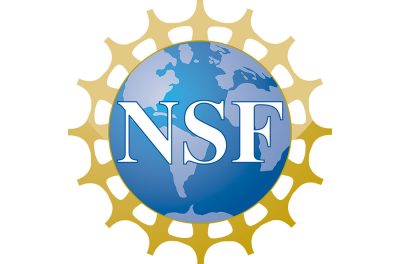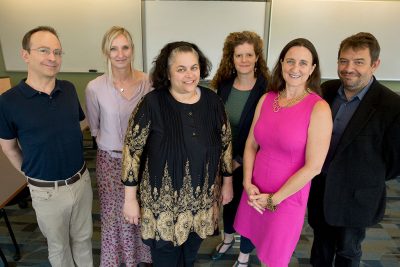Editor’s Note: Christine Buckley contributed to this story.
 Two Neag School researchers are members of an interdisciplinary UConn-based team recently awarded a $3 million grant through the National Science Foundation (NSF) Research Traineeship program to prepare the next generation of Ph.D. students.
Two Neag School researchers are members of an interdisciplinary UConn-based team recently awarded a $3 million grant through the National Science Foundation (NSF) Research Traineeship program to prepare the next generation of Ph.D. students.
D. Betsy McCoach, professor of measurement, evaluation, and assessment in the Neag School, is a co-principal investigator, and Scott W. Brown, Board of Trustees Distinguished Professor of educational psychology and head of the Neag School’s Department of Educational Psychology, serves as a senior scientist on the team, whose funding went into effect Aug. 1.
The five-year grant, titled “Science of Learning, From Neurobiology to Real-World Application: A Problem-Based Approach,” is one of 17 grants totaling $51 million awarded nationwide in the NSF Research Traineeship (NRT) program, across all fields supported by the NSF. The NRT program aims to develop transformative models for graduate education in science, technology, engineering, and mathematics (STEM) fields that, according to the NSF, center on training graduate students “to address complex problems at the intersection of different scientific disciplines and provide them with the skill set to tackle these problems during their training and on entering the workforce.” [1]
In addition to McCoach and Brown, the team includes faculty from UConn Health, the College of Liberal Arts and Sciences, and the School of Fine Arts with expertise in such academic disciplines as genomics, psychology, linguistics, digital media, and communications sciences.
“This project provides a great opportunity for students and faculty in the Neag School of Education to collaborate with colleagues from across the University on basic and applied research related to the science of learning.”
— Professor D. Betsy McCoach
Science of Learning and Art of Communication
Following on the success of the 2012 Integrative Graduate Education and Research Traineeship grant in the science of language at UConn, the project will train 50 students, including 25 Ph.D. fellows, with an estimated two to four doctoral students of each incoming cohort joining the Neag School’s educational psychology Ph.D. program.
The researchers have dubbed the program “Science of Learning and Art of Communication,” or SLAC. Drawing on subfields of cognitive science and neuroscience ranging from genetics to behavioral neuroscience, linguistics, education, psychology, and speech-language-hearing sciences, graduate students and their mentors will work toward developing new, team-based, interdisciplinary approaches to learning. Teams will work at scales ranging from genes and cells to neural networks, behavior, and practical learning settings like classrooms.

“Perhaps more than anything else, how and what we learn shapes who we are,” state the researchers in the project abstract. “This project has the dual aims of achieving a deeper scientific understanding of learning, and communicating a deeper understanding of the science of learning to scientists and the public. Over several decades, diverse fields including genetics, neuroscience, linguistics, education, and psychology have generated a wealth of knowledge about myriad aspects of how humans learn, but a grand challenge remains: to integrate that knowledge into a unified understanding of learning based on these diverse fields, and on scales ranging from the gene to the neuron, brain, and human behavior.”
The program will be accompanied by training in effective communication for audiences ranging from specialist peers to the general public, says James Magnuson, College of Liberal Arts and Sciences professor of psychological sciences and principal investigator for the project.
“From their first day in the program, students will face the challenge of how to clearly and effectively share ideas without assuming prior knowledge or relying on technical jargon,” Magnuson says. “This skill not only enables excellence in research, but empowers trainees to become ambassadors for their work to society as a whole.”
Students will take part in an intensive one-year graduate seminar on the science of learning and the challenge of communicating their research to audiences ranging from specialist peers to schoolchildren, drawing on techniques from the performing arts and new approaches using digital media. In a hands-on practicum, they will develop skills crucial to academic and nonacademic careers that are often absent in graduate education, Magnuson says, including project design and management, budgeting and resource allocation, and external communications.
Problem-Based Learning and Evaluation
In his role as a senior scientist on the team, Brown will be responsible for shaping and providing training to the faculty who are involved regarding what problem-based learning (PBL) is.
“To solve real problems, you need to work with different people with different perspectives, different skill sets, and a willingness to learn,” Brown says. “When you look at something interdisciplinary, like health care, it’s dynamic. It changes; it’s not static. That is one of the things we are going to be emphasizing for our new doctoral students who will go on to be the next generation of science leaders: Things can be dynamic. There can be social, political, and financial pressures that change how the problem is viewed.”
Social perspectives can also come into play, says Brown; for instance, educational psychologists may look at the world differently than an expert in genomics or linguistics would.
“A big mistake people make with problem-based learning is that they think you take a problem, throw some people at it, and they learn. They might learn, but it might not have anything to do with what the goals or objectives are for the training they are going through,” he says. “My job is to help keep people inbounds on problem-based learning.”
McCoach, a co-PI, will be working with students to enhance their data science and data stewardship skills as well as with research teams to provide methodological support. In addition, she will be conducting evaluations throughout the project — for instance, measuring the project’s outcomes and its impact on the students and faculty, including tracking the professional and career trajectories of students who complete the program.
“SLAC provides a great opportunity for students and faculty in the Neag School of Education to collaborate with colleagues from across the University on basic and applied research related to the science of learning,” McCoach says. “I am looking forward to working with colleagues from psychology, linguistics, neurobiology [and other areas] to tackle common problems of interest from a really interdisciplinary perspective.”
Faculty-student research interest groups will serve as brainstorming launchpads for new scientific challenges and research proposals.
The program will also promote diversity in academic and industry careers that require advanced training by prioritizing recruitment and retention.
The project team comprises:
- James Magnuson, professor of psychological sciences, College of Liberal Arts and Sciences (principal investigator)
- William Snyder, professor of linguistics, College of Liberal Arts and Sciences (co-principal investigator)
- Betsy McCoach,professor of educational psychology, Neag School of Education (co-principal investigator)
- Stormy Chamberlain, assistant professor of genetics and genome sciences, UConn Health (co-principal investigator)
- Timothy Miller, visiting assistant professor, School of Fine Arts (co-principal investigator)
- Scott W. Brown, Distinguished Professor of educational psychology, Neag School of Education
- Marie Coppola, associate professor of psychological sciences and linguistics, College of Liberal Arts and Sciences
- Inge-Marie Eigsti, associate professor of psychological sciences, College of Liberal Arts and Sciences
- Holly Fitch, professor of psychological sciences, College of Liberal Arts and Sciences
- Emily Myers, associate professor of speech, language & hearing science and psychological sciences, College of Liberal Arts and Sciences
All team members are also associated with the Connecticut Institute for the Brain and Cognitive Sciences.
Learn more on the NSF website.
[1] https://www.nsf.gov/news/news_summ.jsp?cntn_id=242612&org=NSF&from=news
 Facebook
Facebook
 Twitter
Twitter
 LinkedIn
LinkedIn
